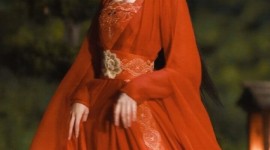Hanfu Fashion Week:Exploring the Revival of Traditional Chinese Clothing
In the heart of our modern world, a movement is quietly brewing that seeks to revive and celebrate the rich cultural heritage of traditional Chinese clothing - Hanfu Fashion Week. This annual event is not just a showcase for exquisite designs, but a testament to the enduring influence of ancient aesthetics and craftsmanship.
The origins of Hanfu can be traced back to the pre-Qin era in China, embodying thousands of years of cultural wisdom and artistic expression. These traditional costumes are not just clothing; they are symbols of a nation's history, culture, and identity. Hanfu Fashion Week seeks to revive this legacy, bringing it into the contemporary era with a fresh perspective and modern sensibility.
The week-long event is a vibrant display of vibrant colors, intricate patterns, and meticulous craftsmanship. Designers from around the world converge to present their unique interpretations of Hanfu fashion, incorporating traditional elements with contemporary designs. The result is a stunning showcase of traditional and modern elements seamlessly fused together.
The event begins with a grand opening ceremony, where celebrities, fashion enthusiasts, and history buffs gather to celebrate the start of the festivities. The ceremony is followed by a series of fashion shows, where designers present their latest collections. These collections range from traditional Hanfu styles with intricate embroidery and vibrant colors to modern interpretations that blend traditional elements with contemporary fashion trends.
During the week, there are also various cultural activities such as workshops, lectures, and cultural performances. These activities provide participants with an opportunity to learn about the history and culture behind Hanfu fashion. They also offer a platform for designers to share their inspiration and ideas, fostering a community of like-minded individuals who share a passion for traditional Chinese culture.
The impact of Hanfu Fashion Week goes beyond the realm of fashion. It is a platform for promoting cultural exchange and understanding between China and the rest of the world. Through this event, people from different cultures get an opportunity to appreciate the beauty and richness of Chinese culture. They also learn about the importance of preserving our cultural heritage and the role of traditional crafts in contemporary society.
Moreover, Hanfu Fashion Week provides a boost to the local economy. The event attracts tourists and visitors from all over the world, injecting significant revenue into the local economy. It also provides an opportunity for local businesses to showcase their products and services, further promoting the local economy's growth.
In conclusion, Hanfu Fashion Week is not just an event; it is a celebration of China's rich cultural heritage and a showcase for the creativity and talent of designers from around the world. It is a platform for promoting cultural exchange and understanding, fostering a community of individuals who share a passion for traditional Chinese culture. Through this event, we can preserve our cultural heritage, celebrate our identity, and promote the growth of our local economy.
As Hanfu Fashion Week continues to grow in popularity, we can expect to see more designers embracing this traditional style, incorporating it into their designs and bringing it to the global stage. We can also expect to see more events and activities that promote the preservation of our cultural heritage and foster cultural exchange between China and the rest of the world.
In the future, Hanfu Fashion Week could become a global phenomenon, bringing people together from different cultures and backgrounds to celebrate the beauty and richness of Chinese culture. It could become a catalyst for promoting tourism and trade between China and other countries, further strengthening cultural ties between nations.
As we move forward into a new era, Hanfu Fashion Week will continue to play a pivotal role in preserving our cultural heritage, promoting cultural exchange, and celebrating the beauty and richness of Chinese culture.



